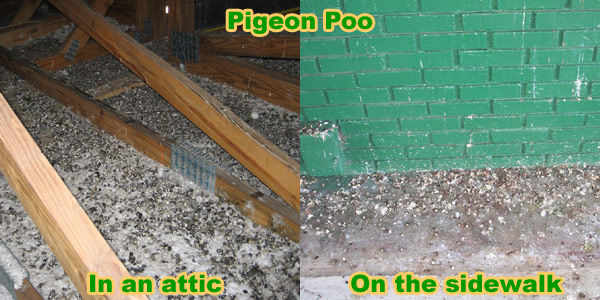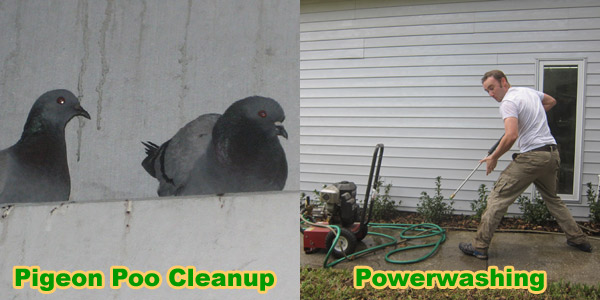- info@wildlife-removal.com
Call us for help in your town
Wildlife Removal Education
How to Clean Pigeon Poop, Droppings from Sidewalk, Buildings, in Attics
Need pigeon removal in your hometown? We service over 500 USA locations! Click here to hire us in your town and check prices - updated for year 2020.

Pigeon feces accumulate wherever these birds roost. If exposed to rain, most of the pigeon poo will wash away. But inside attics, ducts, or any place inside a building, under cover of roof or under ledges, the poo will remain, and it must be cleaned.

Outside and on sidewalks, you can powerwash it off. Inside, however, that's not an option. You'll want to vacuum it out, with a good filter vacuum, and proper protection and HEPA filter mask. Absolutely do not inhale the dust or spores from pigeon feces!
Spray down, or better yet, fog the entire attic or inside space with a special microbial and enzyme based cleaner that will clear out all the leftover feces, pigeon urine, and bacteria, as well as mold and spores and harmful pathogens and microbes.
Read more about diseases from pigeon droppings. Products
such as Bac-Azap or BioShield are good for cleaning.
Click here for a nationwide list of 100's of professional pigeon experts serving all 50 states.
Bird droppings are common in urban settings, especially on or even in buildings frequented by these animals. The pigeon poo is also found in parks where trees are abundant, or on sidewalks below ledges and signs and any place, because they are mostly free
to roost anywhere they like. Removing the feces from the facade of every establishment is important because they are likely to create or spread certain types of viruses that are dangerous to humans when inhaled, not to mention that they do not help in the presentation and the appeal of the building that they can be found. Of course, people would say how dirty the establishment is and that would somehow affect their reputation.
Elimination of such wastes is necessary to avoid certain diseases like histoplasmosis, psittacosis and the occurrence of another virus called Cryptococcus which can also fungal meningitis among humans. To elaborate further histoplasmosis is also a fungal infection which is sometimes also called “cave disease”, “darling disease”, and many others which is caused by the fungus histoplasma capsulatum. It mostly appears as somewhat like a respiratory illness which affects the lungs. On the other hand psittacosis is caused by the bacteria called Chlamydia psittaci which can create an infection and is easily spread out by inhaling bird droppings. Last of all cryptococcosis is the disease brought about by the virus Cryptococcus which can also be found in pigeon droppings.
In order to avoid acquiring the above mentioned diseases as well as the many side effects it might cause in your lives, it is better to clean up all the bird droppings you can see as much as possible not only for hygiene purposes but also to eliminate the possibility of diseases brought about by inhaling the bacteria and viruses found in their wastes.
Of course you are expected to exercise a great amount of caution when dealing with pigeon guano. It is mostly recommended that you protect yourself by covering your face in order to minimize inhaling the odor and some microorganisms found therein. You have to also wear plastic gloves so as not to contaminate yourself with any of the pigeon droppings and in addition to this, you can wear long clothes to avoid getting the wastes into any part of your body but if you are extremely careful you wouldn’t allow yourself to be splashed with their droppings unless they are still roosting exactly above the spot where you are standing. It is not really the dirt or the fact that you have them on your body that is dangerous but the fact that you might inhale the substances that might cause the diseases.
You can try to sprinkle them with water first so as to wet them and avoid being carried by the wind to other places and most especially to the passersby who can easily inhale them. You should also be careful not to really wash them away because they might be carried into some other place where bacteria can still grow and might be more dangerous. If need be, you can have a bucket of disinfectant and a brush to scrub them off the floor of your house or some other parts of the building.
If left unattended especially in roofs, you might find yourself having problems with clogged gutter or some other pipes or tubes. That is why it is also necessary to make sure that your roof is free of these pigeon droppings.
Also it is recommended that you assign a specific dustpan solely for the purpose of getting pigeon guano and not for anything else just to exercise caution of possibly spreading the bacteria that can be found in their wastes. You can also try to place them in a plastic container and tightly seal it to prevent the odor from escaping.
Click here to go back to my main bird removal page.


















